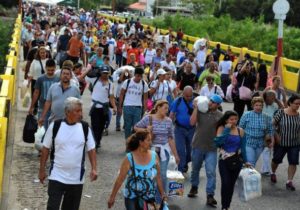Venezuela the latest humanitarian hot spot
 The northern quadrant of South America is the latest hot spot in the world’s burgeoning refugee crisis.
The northern quadrant of South America is the latest hot spot in the world’s burgeoning refugee crisis.
Colombian border authorities say that at least 20,000 are crossing the border in the country each day from Venezuela.
They are fleeing a country that is oil rich but mired in economic and political crisis. Some cross temporarily to find work, food, or medicine; others stay longer.
The exodus is the result of the economic policies of Venezuela’s President Nicolás Maduro which has brought hyperinflation – reaching more than 2,400 percent last year, according to the International Monetary Fund (IMF).
Food shortages in supermarkets are widespread, while the military, loyal to Maduro, control public food distribution centres.
People fleeing say that only those in the regime’s favour receive food handouts and many are turning to the black market where prices are exorbitant.
Hunger and malnutrition are looming as serious problems. Two-thirds of people who responded to a survey by three Venezuelan universities had lost over 11 kilograms in weight during 2017.
Alongside hunger, widespread crime has taken root across Venezuela.
Colombia has started counting the number of Venezuelans entering to try to find who has crossed the border and what their needs are.
Last year about 550,000 Venezuelans to flee last year to Colombia, which shares a porous 2,219-km border with its eastern neighbour.
A country more accustomed to producing refugees than receiving them, Colombian authorities are struggling to adapt to the humanitarian needs of fleeing Venezuelans, and international NGOs are worried about their capacity to assist.
The United Nations High Commissioner for Refugees (UNHCR) is currently running appealing for $US46 million to assist displaced Venezuelans across the region, including those that have fled to Brazil, Chile, Ecuador, and other nations.
But, so far, just 6 percent of the amount has been raised, with many observers believe the figure is far too low to begin with.
There are fears that the tens of thousands of migrants and refugees crossing the border will now end up stuck in temporary camps that were intended only to offer them shelter on arrival.
The funds being raised by UNHCR are to be allocated across eight thematic needs, with 26 per cent earmarked for ensuring fair protection processes and docu0mentation of displaced Venezuelans.
Over $US8 million will be set aside for community empowerment and self-reliance, should the target be reached.
If the UNHCR appeal falls short of their target, there is great concern about the consequences.
“Poor contributions will severely constrain UNHCR contingency preparedness, planning and response, and support to receiving countries to build theirs,” according to the appeal assessment.
“Both will become overwhelmed, placing the safety and well-being of the Venezuelan arrivals in greater peril.”
The International Organisation for Migration (IOM) has also launched a regional plan in response to the crisis requiring $US32.3 million to implement.
It is focused on data collection and dissemination, capacity building and coordination, direct support, and socioeconomic integration.
However, the political situation in Colombia is far from secure.
The government signed a peace deal with the FARC rebel group in 2016, throwing open the possibility of development in long-abandoned corners of the nation. But as armed groups battle for control in FARC’s absence, aid workers and locals in many areas are finding themselves in as much danger as ever.
Also complicating the response in Colombia is a reduction in funding for humanitarian organizations following the peace deal.
The deal formally ended 52 years of civil war, leading donors to begin to withdraw humanitarian assistance from the country: It received almost $40 billion in humanitarian funding last year, the lowest sum for at least a decade.
Laurie Nowell
AMES Australia Senior Journalist












